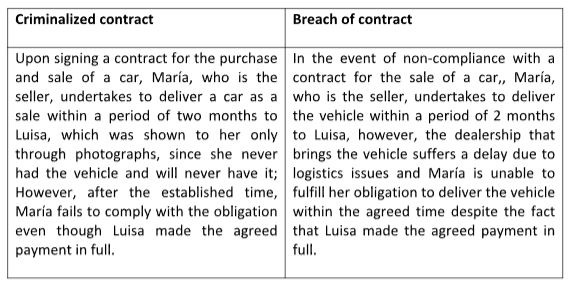DIFFERENCES BETWEEN BREACH OF CONTRACT AND THE CRIME OF SCAM (CRIMINALIZED CONTRACT)
COMMERCIAL LAWCRIMINAL LAW


At first glance in Bolivia, there is no precise system that allows us to differentiate that narrow and marked line that divides breach of contract and criminalized legal business, both emerging from the signing of a contract between parties subject to the fulfillment of obligations and considerations. In this article, we will analyze some characteristics that will allow us to identify a crime of breach of contract.
The contract is the consolidation of a legal transaction between the intervening parties who reciprocally assume obligations and considerations. However, the evolution in the modus operandi of the commission of crimes that seek to harm property allowed the mutation of the conventionally known contract, giving rise to the so-called criminalized contract.
For these purposes, it is necessary to delve into the theory of the crime that explains that malicious intent is the expression of knowledge and awareness at the time of the execution of illicit conduct in the crime of contractual fraud. For a better understanding of the fraudulent element as an essential characteristic of this type of crimes, we must resort to the doctrine issued by the Supreme Court of Justice that, in relation to contracts criminalized by Resolution 056/2016-RRC dated January 21, 2016, has established that fraud manifests itself when the active subject knows, from the moment in which he proposes the contractual negotiation or before, that he will not comply with it, using the contract as a tool against supposed legality, to fulfill its fraudulent purpose, reflected in the improper obtaining of the victim's economic resources.
The criminalized contract occurs due to the simulation that a person makes of fulfilling what was contracted, in reality only intending to take advantage of the counterparty's fulfillment of the obligation. The essential element is the malicious will to breach what has been agreed, so the contract is the instrument of deception that moves the will of the victim camouflaged in an appearance of compliance to consolidate what we know asfraud.
The Supreme Court of Justice, through the reference doctrine, provides us with certain guidelines to recognize, when we are faced with a breach of contract and when faced with a criminalized contract:
Premeditation of the commission of the illicit: The active subject from the moment he proposes the
contractual business knows that he will fail to comply with the agreed provision.
Consummation of the illicit: At the time of the conclusion of the contract, is when the criminalization of the
legal business occurs since the fraudulent purpose is consolidated, since this deception as an integrating
element of the scam camouflaged as an apparent fulfillment through the signing of a contract, is what
manages to move the will of the victim.
Breach of contract: It is differentiated because the cause underlying the breach is supervening and
generally beyond the will of the parties.
Below is a clear example of what was stated:


José Cristian Quinteros Ribera
Lawyer


In the example of signing the contract for the purchase and sale of a car, by which María, as the seller, undertakes to deliver as a sale and within a period of two months, a car to Luisa, the latter knowing that she did not have the vehicle at the time of signing the contract and that she could never deliver it despite the payment made, exhibiting it only through photographs as an element of deception, the crime of fraud is consolidated through the signing of criminalized contracts, since María knew from the first moment that she could not deliver the vehicle due to its non-existence at the time of signing the contract and, in turn, the lack of intention to comply with its obligation, intending as its sole purpose, to receive fair payment from Luisa. In the same case, but with the variant of the delay in the dealership that imports the vehicle that María commits for sale to Luisa but is unable to deliver it within the established two-month period despite the payment made, it can be verified that the cause of non-compliance emerges from an involuntary cause supervening on the signing of the contract, finding ourselves facing a breach of contract.
Although both examples have a certain similarity because the seller enters into the contract knowing that he does not have the car in his possession, in the case of the criminalized contract, the seller's sole purpose is to move the will of the counterparty so that it disposes of its assets using deception as an element. However, in the second example, the breach of contract emerges from a fortuitous and supervening cause since there is no prior and marked intention to breach the contract and take undue advantage of the payment made. Note that both refer to non-compliance, only one is malicious and prior knowledge and the other is not.
To understand a little more and understand the differences that exist between a breach of contract and a criminalized contract, the Bolivian legal system has determined, through its current jurisprudential line, the conceptual scope of the criminalized legal contract; Thus, Relolution 056/2016 dated January 21, 2016 issued by the Supreme Court of Justice, has established that the consummation of the crime of fraud is possible through the execution of contracts motivated by deception. Likewise, the Plurinational Constitutional Sentence No. 0005/2018-S3 dated February 28, 2018, states that contracts as a legal tool can be used as means for deception and induction into error that causes a property disposition to the detriment of the victim, meanwhile, they constitute legal means used for the purpose of consummating different criminal acts such as the crime of fraud, sthelionate, and abuse of trust.
In light of the above, it is recommended, before signing any type of contract, to receive timely and specialized professional advice on the matter, as this can prevent any type of complication or problem in the future.
